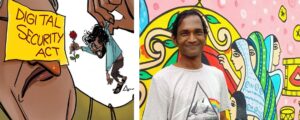14 May 2020

Reporters Without Borders (RSF) calls on the Bangladeshi authorities to immediately release well-known figures held in connection with their coverage of the coronavirus crisis and to drop all charges against them. At least 12 journalists and bloggers have been charged under the draconian 2018 Digital Security Act since the start of May.
Those provisionally detained include cartoonist Ahmed Kabir Kishore, writer and blogger Mushtaq Ahmed and whistleblower Didarul Bhuiyan. They are facing possible life sentences for “spreading rumours and misinformation on Facebook about the coronavirus situation” and “undermining the image of the father of the nation,” the “national anthem” or “national flag” under Section 21 of this Kafkaesque law.
Kishore’s “insulting” was limited to publishing a series of cartoons of politicians entitled “Life in the Time of Corona.” Ahmed simply wrote an article criticizing the shortage of personal protective equipment for health professionals. And Bhuiyan heads a working group that monitors and informs the public about cases of governmental corruption and mismanagement linked to the Covid-19 crisis.
Arrested on 4, 5 and 6 May by the counter-terrorist Rapid Action Battalion, Kishore, Ahmed and Bhuiyan are on a list of 11 well-known names accused of being linked to a Facebook page entitled “I am Bangladeshi.” Those named on this charge sheet also include the well-known blogger Asif Mohiuddin, the journalist Shahed Alam and the editor of the Netra News website, Tasneem Khalil, who have avoided arrest because they are based abroad.
Exploitation
“Journalists, bloggers and cartoonists have no place being imprisoned for expressing alternative views on how the coronavirus crisis should be managed,” said Daniel Bastard, the head of RSF’s Asia-Pacific desk. ‘We call on justice minister Anisul Huq to order the immediate withdrawal of the charges against these 11 well-known figures and the immediate release of those held. Above all, the government must immediately amend the Digital Security Act, which is often exploited to curtail press freedom.”
It was under the Digital Security Act that defamation charges were brought on 6 May in Barguna, 325 km south of Dhaka, against Jamal Mir, the Banglanews24.com website’s correspondent, and Suman Shikder, a reporter for News24 TV, the Bangla Tribune website and the Dhaka Tribune daily newspaper. Both were arrested that evening. According to the Dhaka Tribune, four other Banglanews24.com journalists are charged in the same case.
In Sunamganj, 275 km northeast of Dhaka, Mahtab Uddin Talakdar, the editor of the Daily Haorancher Kotha and SATV’s local correspondent, was arrested under the Digital Security Act on 4 May on a complaint by a local representative of the ruling Awami League about a Facebook post in which Talakdar reported that Bangladesh’s anti-corruption commission had arrested a local parliamentarian, Mouazzam Hossain Ratan. The next day, Talakdar was brought before a district court, which ordered his immediate detention.
Draconian provisions
Police in the Dhaka suburb of Narsingdi arrested Dainik Grameen Darpan editor Ramjan Ali Paramanik, his reporter Shanto Banik and Narshingdi Pratidin news website editor Shawon Khandaker Shaheen in raids on their homes on 1 May. They were placed in detention in response to a complaint under the Digital Security Act by an inspector at Ghorashal police station about their coverage two days earlier of a man’s death in detention there.
A journalist who reports for Dainik Manabzamina under the pseudonym of MA Hassan was also arrested on 1 May in Fulgazi, 175 km southeast of Dhaka. According to the information obtained by RSF, it was the city’s mayor who brought the complaint against him.
Since the start of the year, at least 22 Bangladeshi journalists have been the targets of complaints under the Digital Security Act, whose draconian provisions RSF has been denouncing since January 2018. They include six who were targeted in April because of their coverage of the coronavirus crisis, as RSF reported at the time.
Bangladesh is ranked 151st out of 180 countries in RSF’s 2020 World Press Freedom Index, one place lower than in 2019.
Lire la dépêche en français : RSF dénonce une inquiétante vague d’arrestations contre plusieurs journalistes et un caricaturiste bangladais









